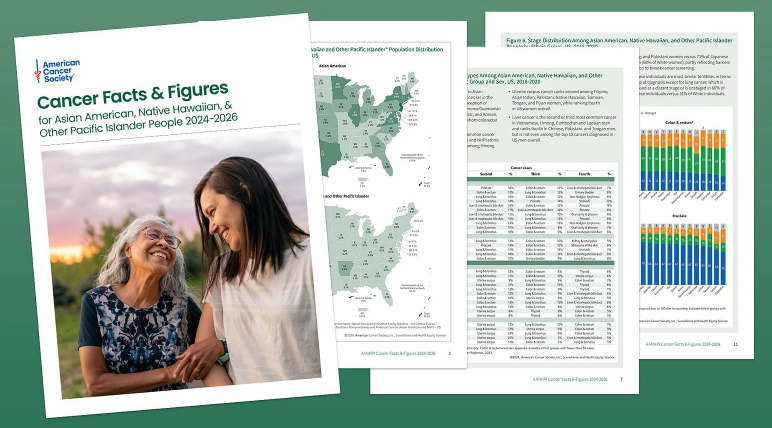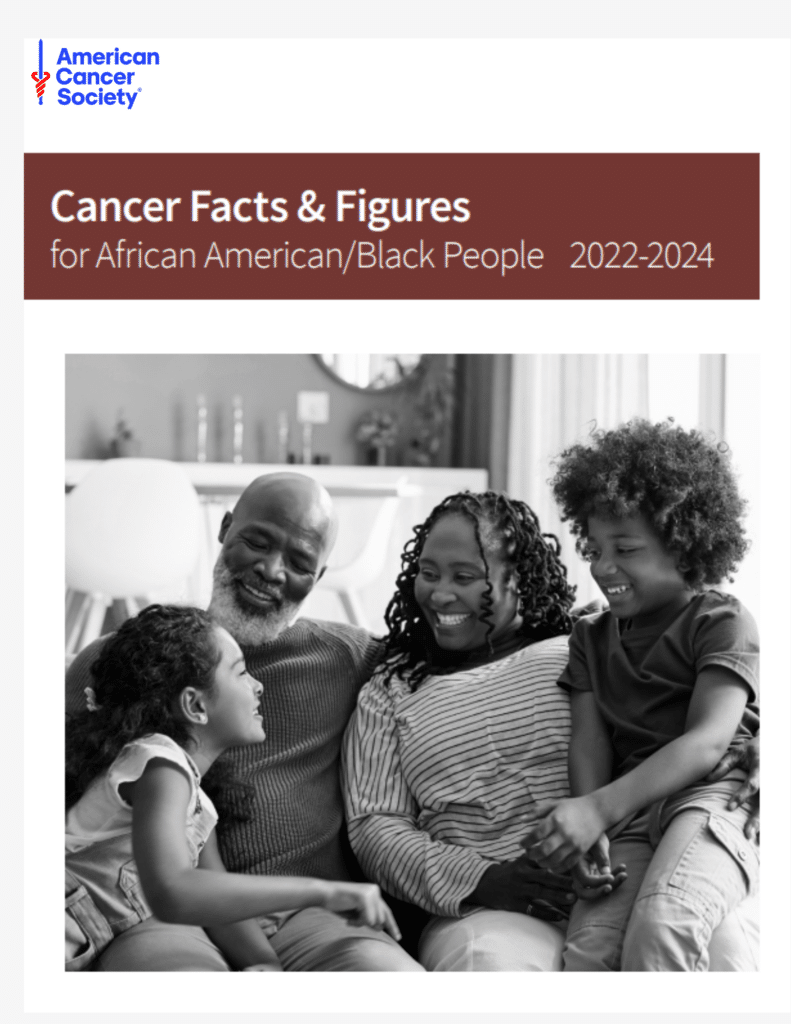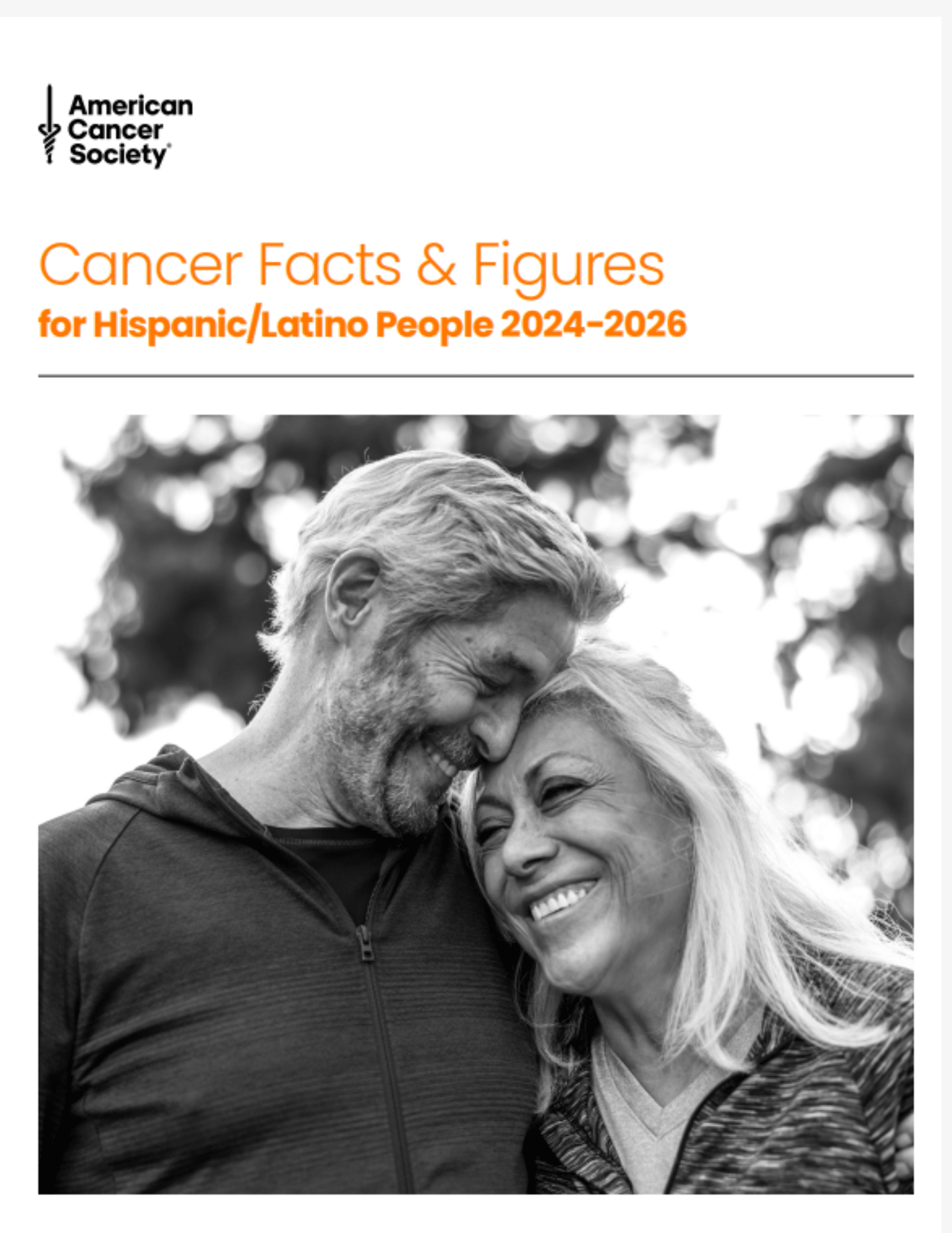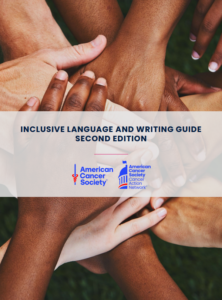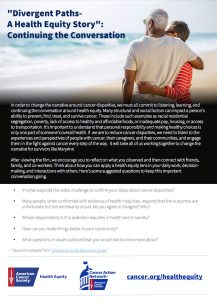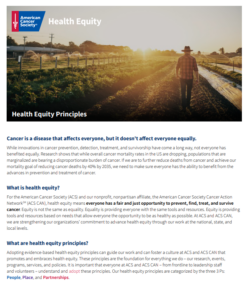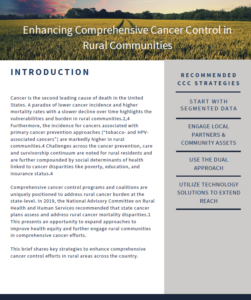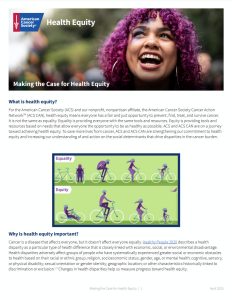Health equity means that everyone has a fair and just opportunity to be as healthy as possible. It is not the same as equality. For the American Cancer Society and American Cancer Society Cancer Action Network, health equity means everyone has a fair and just opportunity to prevent, find, treat, and survive cancer. Below is a selection of ACS resources to help your state coalition address issues of health equity in cancer control.
Health Equity Resources
News
ACS Research News: Disparities
Reducing cancer disparities across the cancer continuum and advancing health equity is an overarching goal of the American Cancer Society (ACS). Read the latest ACS research highlights on issues related to disparities.
2024 Cancer Facts and Figures for Asian American, Native Hawaiian & Other Pacific Islander People.
Data
Cancer Facts and Figures for African Americans
Cancer Facts and Figures for African Americans. This publication provides the estimated numbers of new cancer cases and deaths for African Americans, as well as the most recent statistics on cancer occurrence and information on cancer risk factors (e.g., tobacco use, obesity, and physical inactivity) and the use of cancer screening tests.
Cancer Facts and Figures for Hispanics and Latinos
Cancer Facts and Figures for Hispanics and Latinos. This publication provides the estimated numbers of new cancer cases and deaths for Hispanics and Latinos, as well as the most recent statistics on cancer occurrence and information on cancer risk factors (e.g., tobacco use, obesity, and physical inactivity) and the use of cancer screening tests.
Best Practice Resources
The ACS Health Equity YouTube Playlist
The American Cancer Society (ACS) and the American Cancer Society Cancer Action Network (ACS CAN) believe no one should be disadvantaged in their fight against cancer because of how much money they make, the color of their skin, their sexual orientation, their gender identity, their disability status, or where they live. Watch volunteers and staff champions from the ACS and ACS CAN describe the importance of health equity.
Divergent Paths - A Health Equity Story - Continuing the Story
If we are to reduce cancer disparities, we need to listen to the experiences and perspectives of people with cancer, their caregivers, and their communities. It will take all of us working together to change the narrative for survivors like MaryAnn.
Health Equity Principles
Health Equity Principles. This document presents nine principles of health equity practice and suggested strategies and examples that guide ACS and ACS CAN’s work to foster a culture that promotes and embraces health equity. Suggestions are categorized by the “3 P’s (people, place, partnership).
ACS Health Equity Community Projects
This guide provides background information on the three social determinants of health topics that focus on the following ACS Health Equity Community Projects: 1. Financial stability to support cancer survivors; 2. Food security and access to healthy foods to support cancer prevention, treatment, and survivorship; and 3. Transportation and mobility to support cancer prevention, early detection, treatment, and survivorship services.
The Circle of Life Program
The Circle of Life Program. The American Cancer Society's Circle of Life (COL) program addresses the cancer information needs of American Indian communities across the cancer continuum by providing resources and training. Important cultural values such as the mind-body-spirit connection, storytelling, the importance of intergenerational connectivity, and visual communication are interwoven throughout the materials.
Cancer Disparities Chartbook
The Cancer Disparities Chartbook. This chart book illustrates the scope of cancer disparities that exist across our nation, highlighting some of the greatest gaps and challenges in the cancer continuum. Data is included on six major cancer types — lung and bronchus, colon and rectum, breast, melanoma, prostate, and uterine/cervix.
The NCCRT 80% in Every Community Campaign
The National Colorectal Cancer Roundtable 80% in Every Community Campaign. Screening can prevent colorectal cancer through the detection and removal of precancerous growths as well as detect cancer at an early stage, when treatment is usually less extensive and more successful. The 80% by 2018 national screening campaign achieved tremendous success, and between 2012 and 2016, 5.1 million additional US adults (50 to 75) were screened. The 80% in Every Community campaign is an NCCRT initiative that continues the progress and commitment from 80% by 2018 to increase colorectal cancer screening rates. The 80% in Every Community campaign acknowledges that not all communities are benefiting equally, with people less likely to get tested including those who are Hispanic, American Indian or Native Alaskan, Asian or Pacific Islander, men, or 50-64 years of age. Those who live in rural areas, are lower income, or with less education also get screened at lower rates. “80% in Every Community” is working to see every community benefiting from increased colorectal screening rates. The initiative emphasizes evidence-based colorectal cancer screening activities that respond to individualized needs, barriers, and motivations within a community.
Journal Articles
Making the Case for Health Equity
Health equity means that everyone has a fair opportunity to prevent, find, treat, and survive cancer. Health equity allows everyone the opportunity to be as healthy as possible. This short document provides statistics on health equity and approaches that can help to advance health equity.
Understanding and Addressing Social Determinants to Advance Cancer Health Equity
Understanding and addressing social determinants to advance cancer health equity in the United States: A blueprint for practice, research, and policy. This article introduces a framework for understanding and addressing social determinants to advance cancer health equity and presents actionable recommendations for practice, research, and policy.
Racial/Ethnic Disparities in Lost Earnings from Cancer Deaths
Racial/Ethnic Disparities in Lost Earnings from Cancer Deaths in the United States. This article by ACS researchers puts a price tag on racial disparities in cancer mortality, finding that $3.2 billion in lost earnings would have been avoided in 2015 if non-Hispanic blacks had equal years of life lost from cancer deaths and earning rates as non-Hispanic whites.
How Structural Racism Can Kill Cancer Patients
How Structural Racism Can Kill Cancer Patients. Black patients with breast cancer and other malignancies face historical inequities that are ingrained but not inevitable. In this article, the second of a 2‐part series, we explore the consequences of and potential solutions to racism and inequality in cancer care

